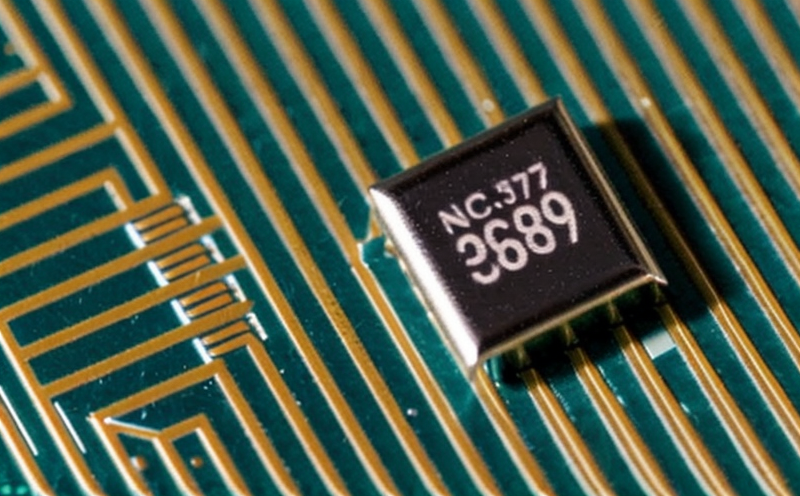IEC 60749-30 Interconnect Fatigue Lifetime Testing
The IEC 60749-30 standard is a crucial benchmark for ensuring the reliability and lifetime of interconnects in semiconductor devices. This testing method evaluates how interconnects, which are critical components connecting various parts within microchips, withstand mechanical stresses over time. These stressors can come from physical movements, temperature cycling, or other environmental factors that cause fatigue. Understanding these parameters is essential for ensuring the long-term performance and durability of semiconductors.
Interconnects are typically made of copper or aluminum, materials chosen for their excellent electrical conductivity and mechanical properties. However, even with high-quality materials, interconnects can suffer from degradation due to repeated mechanical stress. Fatigue failure occurs when a material experiences cyclic loading that exceeds its fatigue strength. This results in micro-cracks forming within the metal matrix, eventually leading to complete failure.
IEC 60749-30 provides a standardized approach for simulating and testing these stresses in controlled laboratory environments. The process involves applying mechanical stress to the interconnects using specific test fixtures designed to mimic real-world conditions as closely as possible. This includes varying the direction, frequency, and magnitude of the applied force over specified durations.
The standard specifies various parameters that need to be carefully controlled during testing, such as temperature cycles, vibration levels, and load application rates. These factors are crucial in accurately representing the operational environment the interconnects will encounter in real applications. For instance, a microchip used in automotive electronics might experience wide temperature ranges and frequent vibrations due to vehicle movement.
Once the tests are conducted, the results provide invaluable data on the fatigue life of the interconnects. This information is critical for R&D engineers in optimizing designs and materials to enhance reliability. Compliance officers can use these test results to ensure their products meet international standards, thereby reducing the risk of product recalls or non-compliance penalties.
Furthermore, understanding the specific requirements outlined in IEC 60749-30 helps quality managers make informed decisions about production processes and material sourcing. By selecting interconnects that pass these rigorous tests, they can ensure their products are robust enough to withstand the challenges of real-world use.
In summary, IEC 60749-30 is a vital standard for ensuring the reliability and lifetime of semiconductor devices. Its detailed protocols provide critical insights into how interconnects behave under various stress conditions, enabling manufacturers to improve product quality and extend operational lifetimes.
Benefits
- Enhanced Reliability: Ensures that the interconnects can withstand mechanical stresses over extended periods, reducing the risk of early failures.
- Improved Product Quality: By identifying potential issues during development stages, manufacturers can refine their designs and materials.
- Avoidance of Non-Compliance Penalties: Ensures that products meet international standards, thereby avoiding costly legal actions or product recalls.
- Increased Consumer Trust: Products known to be reliable and durable are more likely to gain consumer confidence and loyalty.
Industry Applications
The IEC 60749-30 testing method is widely used across various industries that heavily rely on semiconductor technology. These include automotive, aerospace, consumer electronics, and medical devices.
- Automotive Industry: Ensures that the interconnects within ECU (Electronic Control Units) can withstand the harsh environmental conditions found in vehicles.
- Aerospace Sector: Critical for testing components used in avionics to ensure they can operate reliably under extreme temperatures and vibrations.
- Consumer Electronics: Used to improve the durability of interconnects in smartphones, tablets, and other portable devices that experience frequent handling.
- Medical Devices: Ensures that components used in medical equipment can operate reliably even after repeated sterilization and use.
International Acceptance and Recognition
The IEC 60749-30 standard is internationally recognized for its stringent requirements on interconnect fatigue testing. It has been adopted by several countries as a benchmark for quality and reliability in semiconductor devices.
- United States: The National Institute of Standards and Technology (NIST) recognizes IEC 60749-30 as an authoritative source for testing interconnects.
- European Union: EU directives often reference this standard to ensure interoperability between different electronic devices within the region.
- China: The Chinese National Standards (GB/T) incorporate IEC 60749-30 in their guidelines for quality testing of interconnects.





